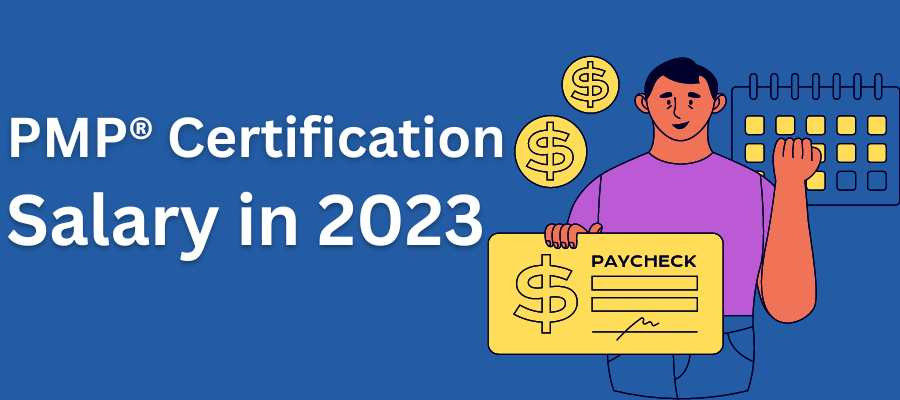PMP® Certification: Job and Salary Scope in 2023 - Everything You Need to Know

PMP certification exams are among the top recognized credentials in the project management field, and with this recognition comes a boost in salary. In 2023, the job and salary scope for those with PMP® certification is predicted to be quite favorable. Project managers with PMP® will likely have a wide range of career opportunities, including working on complex projects, leading teams, developing strategic plans, and taking on management roles.
Additionally, as certified professionals, they can also look forward to an increase in their salaries as they gain experience and expertise over time. With these possibilities plus the impressive salaries that come along with it, obtaining a PMP® certification will be worth it by 2023!
Increase Your Earning Potential with A PMP® Certification
The financial reward outweighs the significant time and effort required to obtain your PMP® certification. Getting certified demonstrates that you have the abilities needed to manage a team. A company's investment in a PMP®-certified employee can pay off handsomely. Using the PMP® certification skills you've acquired when a company recruits you to manage and deliver projects successfully, you may save project costs and boost profitability for your employer.
Furthermore, as businesses embrace more project-oriented operating models, the importance of PMP® certification holders is increasing. Therefore, when business goals and procedures evolve, there will be a greater demand for project managers, change managers, project analysts, and similar professionals. High retirement or attrition rates may also contribute to the need for PMP® certificate holders. This industrial vacuum, which results from the retirement of an older worker generation, makes it more critical than ever to hire people with PMP® credentials.
PMP® Certification Salary Range
You can expect a higher salary in your project management capacity than your previous income or the wages of your non-certified peers because PMP credential holders provide so much value to businesses. According to PMI, non-certified project managers in the United States get an average salary of $95,000 yearly. Instead, project managers who hold the PMP® certification make $120,000 annually. Based on the PMP® certification factor, that represents a wage boost of around 25%. Additionally, as your project management job develops and grows, you may anticipate seeing an ongoing increase in your pay.
The majority of project managers polled "(70%) say that their overall income (including salary, bonus, and other forms of compensation) increased over the 12 months before completing the salary survey," according to PMI's Project Management Salary Survey 10th Edition. Over that time, around a quarter (26%) reported rises of at least 5%.
Why Does a PMP® Credential Holder Earn More?
Holders of the PMP credential are the best candidates for any position that requires coordinating the implementation of a new organizational-wide software solution or a complete organizational restructure. People with PMP® certification are significant assets, and businesses worldwide are starting to realize this.
According to the Project Management Institute's (PMI)® Earning Power Report, there will be 90 million project management-related employment responsibilities that need to be filled by 2027. The demand for PMP®-certified individuals will therefore soar in less than ten years, but will there be a workforce to meet it? Many project managers are obtaining the certification due to this need.
Creates New Career Opportunities
Companies and clients alike quickly see the advantages of having a team member with a PMP® certification. Holders of the PMP® certification have shown an understanding of tried-and-true project management techniques, making them likely candidates to finish projects on schedule and within budget. Because of this, having a PMP® certification on your resume can help you find possibilities to assume additional responsibility.
You'll probably gain more job stability due to the respect you get for holding the PMP® certification. Projects shouldn't be invested in by businesses only to collapse when the leadership changes.
Earning Potential through Experience
It stands to reason that someone with more experience would have a higher potential income. But given expertise, how much of a pay rise can PMP® holders anticipate? With experience, PMP credential holders can expect more outstanding average wages as they advance in the workforce, much like in many other sectors. To remain competitive in the field, these PMP® credential holders must continue to retain their certification.
To maintain the PMP® certification, you must complete 60 professional development units (PDUs) and pay a renewal fee every three years. The longer you hold your PMP credential, the greater the return on your investment, even though this may seem like a lot of labor or a significant investment.
Final Word
As you can see, the PMP® certification salary is rising and will only continue increasing in value. The job market for project managers is also multiplying, so getting your PMP® certification now could be one of the best career decisions you make. Are you ready to take your career to the next level? Check out our selection of PMP® certification courses today and get started on your path to a high-paying project management career.
Reference
- https://www.pmi.org.in/manageindia/articelDetails.aspx?id=916
- https://www.pmi.org/learning/careers/project-management-salary-survey



